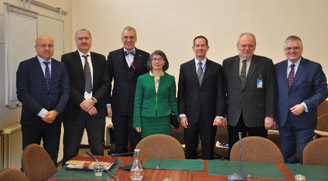Strengthening NATO-EU-OSCE security dialogue on arms control
On 10 February 2017, NATO convened an informal workshop on how to reinforce security dialogue in the Euro-Atlantic region. It focused more specifically on the importance of three major regional organisations – NATO, the European Union (EU) and the Organization for Security and Co-operation in Europe (OSCE) – in supporting each other to improve existing arms control mechanisms.

The workshop included the participation of the European External Action Service (EEAS), the OSCE Conflict Prevention Centre, the Stockholm International Peace and Research Institute (SIPRI), and senior staff from NATO and delegations.
All speakers agreed that the arms control and confidence- and security-building measures (CSBMs) that reside in the OSCE context play a central role in preserving peace and security throughout the Euro-Atlantic region. Reinforcing and modernising these tools would be a joint endeavour that requires the full participation of all.
The keynote speeches given by Camille Grand (NATO), Ambassador Jacek Bylica (EEAS) and Ambassador Marcel Pesko (OSCE Conflict Prevention Centre), reflected on how their organisations perceive the security environment and how a common toolkit of arms control and CSBMs would contribute to peace, security and stability. NATO’s Deputy Secretary General, Rose Gottemoeller, stressed that arms control and non-proliferation contribute to the security of the Euro-Atlantic area and stated that only an honest and open engagement on dialogue with all nations would help to achieve peace.
The value of a structured dialogue
The participants shared their views on the existing security environment in Europe and stressed the value of CSBMs and the importance of political engagement in order to reduce risks, without compromising key principles and rules.
The OSCE was highlighted as a perfect framework for a structured dialogue on the current and future challenges to security. It was stressed, however, that a structured dialogue should not be used as a replacement for existing discussions or instruments and that political agreement cannot be reached without the building of fundamental trust in the region.
The existing norms and principles embodied by the Helsinki Final Act and existing tools such as CSBMs, continue to serve as the fundamental basis to increase security and predictability. Progress could begin by first building an honest dialogue on threat perceptions and military developments, and then addressing the ways existing CSBMs could be improved to address these concerns. Depending on the desires of the parties, the process could then lead to further discussions on conventional arms control. However, political will and engagement by top-level leadership in capitals would be necessary for any progress to be made in Vienna.

From left: Ambassador Marcel Pesko, Dr Ian Anthony, Mr William Alberque, Ambassador Sian MacLeod, Mr Fred Frederickson, Ambassador Adam Kobieracki, Ambassador Jacek Bylica
The workshop touched upon the need to look beyond the methods of the Cold War, including alternatives to conflict resolution that would address identity and historical memory in resolving frozen conflicts. The role and involvement of civil society, think-tanks, academia, and non-governmental organisations in this process was highlighted in this regard to increase societal buy-in and ownership.
